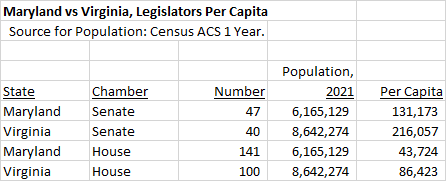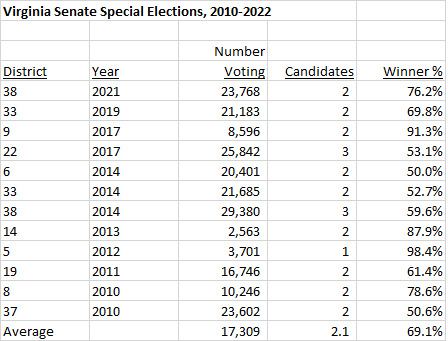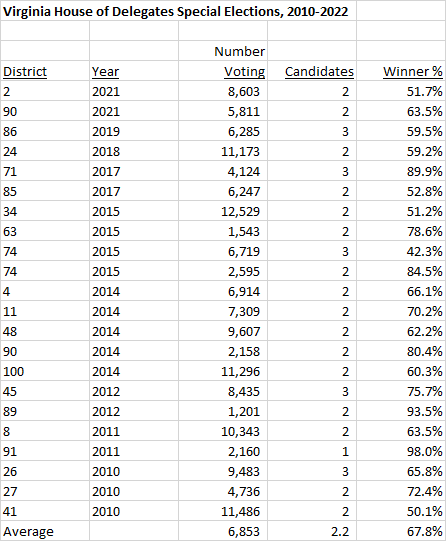By Adam Pagnucco.
Few people other than central committee members like the current process of appointments for state legislative vacancies. Most folks who contact me about this prefer special elections, just as most Maryland voters do. But every now and then I hear from people who predict that almost no one would vote in special elections for state legislators. One reader told me, “A special election would be fraught, in my opinion, because no one knows who the hell we are, and, well… what happens when you throw a party and no one shows up?”
That’s a fair question. The Commonwealth of Virginia holds special elections for state legislative vacancies. Does anyone vote in them?
First, let’s understand how special elections work in Virginia. §24.2-216 of state code provides for special elections in the case of vacancies in the General Assembly. §24.2-509 delegates to political parties the method of determining their nominee. Options include an assembled caucus (think Iowa), a convention or an actual primary election. The state’s Department of Elections administers special general elections. §24.2-682 sets out the timing of special elections:
Notwithstanding any charter or special act to the contrary, the following provisions govern the times for holding special elections. Every special election shall be held on a Tuesday. No special election shall be held within the 55 days prior to a general or primary election. No special election shall be held on the same day as a primary election. A special election may be held on the same day as a general election.
§24.2-216 adds, “Notwithstanding any provision of law to the contrary, no election to fill a vacancy shall be ordered or held if the general or special election at which it is to be called is scheduled within 75 days of the end of the term of the office to be filled.”
Special elections for state legislative vacancies in Virginia can be held quickly. In November 2022, State Senator Jen Kiggans won a seat in Congress and resigned from the state legislature. A special election for her seat was set for today, the day before the next session of the General Assembly. Soon afterwards, Delegate Ronnie Campbell passed away on December 13. A special election for his seat was also set for today. Yet another special election in the House is set for today. Both chambers in the Virginia General Assembly have razor-thin margins so these special elections will be very meaningful.
Like Maryland, Virginia has a Senate and a House of Delegates. Unlike Maryland, its delegates come solely from single-member districts as Virginia stopped using multi-member districts in 1982 under pressure from the U.S. Justice Department. That said, Virginia has fewer state legislators than Maryland even though it is a bigger state, meaning that its state legislative districts are larger.

Virginia’s Historical Elections Database contains the results of 53 special general elections in its senate and 79 special general elections in its house since 1947. Adding both chambers together, that’s an average of 1.8 special elections a year. Let’s look at how many people voted in the special general elections since 2010, starting with the Virginia Senate.

Twelve special elections in the senate have been held in the last twelve years. All but one of them had multiple candidates. In five of them, the winner received less than 60% of the vote. The average turnout was 17,309 voters.
Now to the House of Delegates.

Twenty-two special elections in the house have been held in the last twelve years. Again, all but one of them had multiple candidates. In seven of them, the winner received less than 60% of the vote. The average turnout was 6,853 voters.
So judging by the experience of Virginia, the notion that no one votes in special elections for state legislature is rubbish. Thousands of people vote in them. They have genuine competition. Many of them are fairly close. (The ultimate nail-biter occurred in 2014, when a Hampton Roads senate district special election produced a 9-vote margin for a Democrat out of 20,401 votes cast.) Special elections don’t bankrupt the state’s budget and Virginia is at least as well-run as Maryland. If thousands of Virginia voters participate in special elections, there is no reason to believe that thousands of Maryland voters would not do so the same.
It is also darkly ironic that Virginia, a state in which conservatives and Republicans exert significant influence, uses special elections while Maryland fills state legislative vacancies with party-controlled appointments. How does that make you feel, Maryland Democrats?
Maryland voters consistently vote to approve special elections whenever they appear on the ballot and our sister state across the Potomac uses them to fill its General Assembly vacancies all the time. It’s time for the excuses to stop. Come on you state legislators, pass a constitutional amendment, get rid of the boss system and let’s have special elections!
